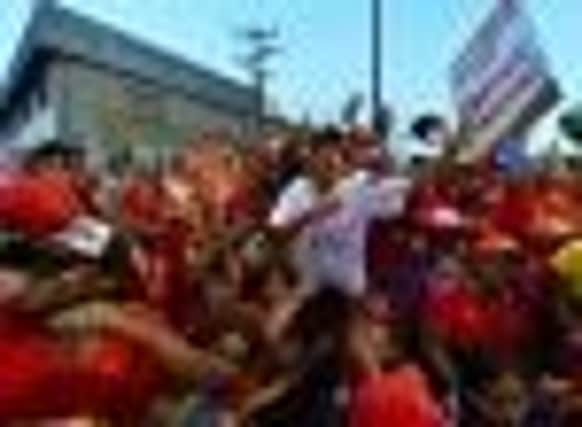Toughest test for Chavez as Venezuelans go to polls


The contest pits Mr Chavez’s charisma and oil-financed largesse against Mr Capriles’ promise of jobs, safer streets and an end to cronyism.
Mr Chavez, 58, made a remarkable return from cancer this year and wants a new six-year term to consolidate his self-styled socialist revolution.
Advertisement
Hide AdAdvertisement
Hide AdMr Capriles, a boyish 40-year-old state governor, has run a marathon eight-month campaign of house-by-house visits that have galvanised a disparate opposition and set up its best shot at the presidency since Mr Chavez’s election in 1998.
“Venezuela was sinking when it was governed by the bourgeoisie, and our people have made history with a revolution that pulled Venezuela from the mire,” Mr Chavez told adoring supporters at one of his final campaign rallies. “Venezuela cannot go back 20 years.”
The former military officer, who survived a short-lived coup against his rule in 2002, has developed a near cult following by casting himself as a modern-day Simon Bolivar – Latin America’s late-18th and early 19th century liberator – while pushing oil revenues into social programmes.
Most pollsters put Mr Chavez in front, but two have Mr Capriles just ahead. The opposition leader has had more momentum in the final days of the campaign and he is predicting victory. The vote is also a cliffhanger for other left-wing governments in the region, from Cuba to Ecuador, who depend on Mr Chavez’s discounted oil sales and financial assistance.
Mr Chavez’s stories of his poor but happy childhood in a small village have helped him create intense emotional bonds with poor Venezuelans who see him as one of the family. For nearly a decade he has won over voters with free health clinics, subsidised foodstuffs and new universities. Over the past year he launched programmes to give pensions to the elderly, stipends to poor mothers, and tens of thousands of new homes were handed over on live television to tearful supporters.
At a rally in his hometown of Sabaneta, Mr Chavez stood on the back of a pick-up truck pushing though a throng of supporters. Supplicants shouted to him asking for help getting a home or a job, or thrust hand-written letters into boxes and large bags carried by his staff.
“I came with 12 people to tell him we’re going to vote for him,” said Emilia Fernandez, 45, a sugar worker. Yet day-to-day issues are overshadowing ideological fervour. Nationalisations have weakened private enterprise and given party apparatchiks growing control over jobs. Weak law enforcement, dysfunctional courts and plentiful arms have made Venezuela more violent than some war-torn countries. Frequent blackouts are a reminder of squandered oil income.
Mr Capriles has promised to shed Mr Chavez’s vision of a state-led economy for a balance of social welfare and free enterprise. He is an admirer of Brazil’s market-friendly Left, which has pulled close to 35 million people into the middle class over a decade. “The candidate of the government reached office with good intention, but he’s no longer interested in change, he’s sick with power,” Mr Capriles said this week. “This government’s time is up.”